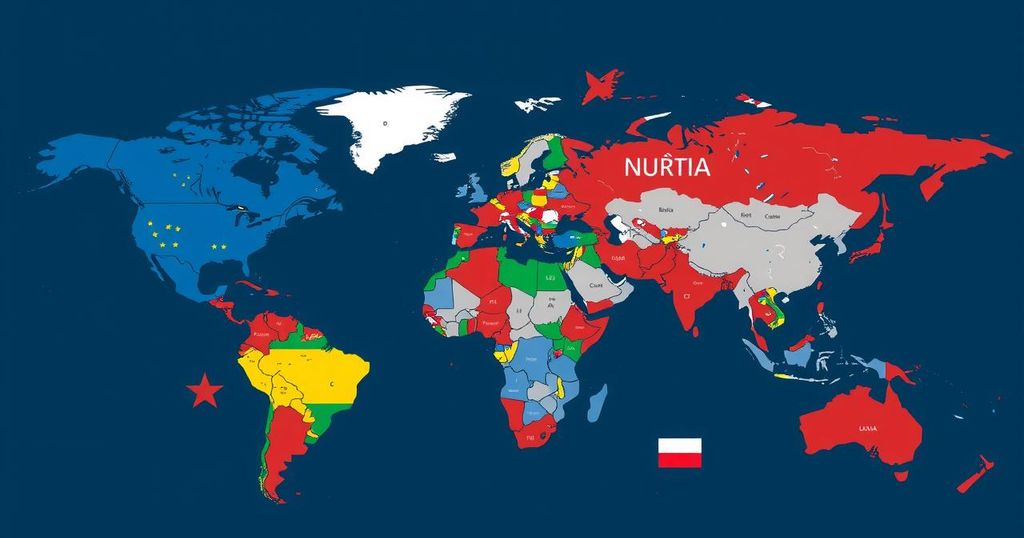Global Developments: Migration Measures, Escalating Conflicts, and Political Shifts

This article discusses significant global events, including the Netherlands’ new migration policies resulting from a surge in asylum applications; a deadly attack in Sudan escalating ongoing conflict; a mass protest in South Korea opposing same-sex partnership rights; China’s condemnation of a US arms sale to Taiwan; and Bulgaria’s uncertain electoral outcomes amid shifting political alliances.
On Friday, the nationalist government of the Netherlands sanctioned new stringent measures regarding migration, which include enhanced border checks, the cessation of mandatory municipal placement for asylum-seekers, and restrictions on family reunification. This decision follows a surge of 51,000 asylum applications over the previous year and mirrors similar movements in Italy, Sweden, and various other European Union countries towards stricter immigration policies. Meanwhile, in Sudan, a violent assault by the Rapid Support Forces resulted in the deaths of at least 124 individuals in Al-Sareeha village. This tragic event also led to over 200 injuries and the detention of 150 individuals. It underscores the rising tensions in the ongoing conflict between the RSF and the Sudanese Armed Forces, which has already displaced millions, exacerbating the ongoing humanitarian crisis. In Seoul, South Korea, a significant protest was organized by Christian groups on Sunday against a court ruling that permits same-sex partners to access spousal health benefits. Organizers claimed that over a million individuals participated in the demonstration, though police estimates placed the number at 230,000. Protesters expressed concerns that this ruling might facilitate the legalization of same-sex marriage in the country. Additionally, China vehemently criticized a recent $2 billion arms sale from the United States to Taiwan, marking the 17th such transaction under the Biden administration. The Chinese government, in its response, vowed to implement “countermeasures” to safeguard its sovereignty, stating that the sale, which includes advanced air defense systems, “seriously damages China-US relations, and endangers peace and stability” within the Taiwan Strait. As the political landscape shifts in Bulgaria, initial exit polls indicate that Boyko Borisov’s GERB party is positioned to lead in the country’s seventh election within a span of three years. However, the feasibility of forming a coalition remains uncertain, as the previous election in June resulted in a hung Parliament. In this election, the pro-Russian Vazrazhdane party did not perform as anticipated, while the Reformist PP-DB exceeded expectations. Final electoral results are projected to be released on Monday.
The recent developments across various countries reflect a wave of political and social changes influencing international relations and domestic policies. In the Netherlands, the increased scrutiny on asylum applications indicates a broader trend towards more rigorous immigration practices within Europe. Concurrently, the conflict in Sudan highlights the dire humanitarian situation resulting from internal strife, affecting millions. South Korea’s ongoing debates surrounding LGBTQ+ rights resonate with broader global conversations about equality and representation. China’s response to US arms sales to Taiwan further illustrates the strained geopolitical dynamics in the Asia-Pacific region, where sovereignty and national security are pivotal concerns. Lastly, Bulgaria’s electoral uncertainty reflects the challenges faced by political parties in establishing stable governance amidst fluctuating public support and fragmented coalitions.
The reported incidents reveal significant shifts in policies and social dynamics across nations, underscoring the complex interplay between political governance, human rights, and international relations. The Netherlands’ new migration policies signify a tougher stance on immigration amidst a European trend. The tragic violence in Sudan calls for urgent humanitarian intervention. In South Korea, the societal debates over LGBTQ+ rights continue to provoke strong reactions. Furthermore, China’s condemnation of US arms support to Taiwan adds another layer of tension in international discourse. Finally, Bulgaria’s electoral scene highlights the continuing challenges faced in achieving political stability amid changing public sentiments.
Original Source: www.gzeromedia.com







